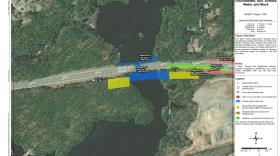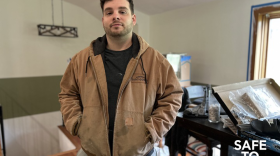New Hampshire residents can have their say Monday night about future federal regulations on a class of potentially toxic industrial chemicals called PFAS.
Exeter will host two days of New England-wide public meetings on the issue.
It’s the EPA’s first regional public engagement on its new standards for PFAS, or per- and polyfluoroalkyl substances.
Right now, the EPA only has a health advisory on some kinds of PFAS -- not a binding limit. The agency will begin planning one this year.
It also wants to list PFAS as an official hazardous substance and develop protocols for cleaning it up. And it plans to study two PFAS-related classes of chemicals, known as GenX and PFBS.
Those are now more commonly used in American manufacturing than PFAS, which was phased out and no longer imported after around 2000. It is still used in products overseas.
New England EPA Administrator Alexandra Dunn tells NHPR they want the public's help to achieve their goals around PFAS.
"We want to present those to the public,” she says. “We also want a chance to hear from communities directly about their experiences with these chemicals in their community."
New Hampshire and neighboring states have their own varying standards for PFAS and for dealing with it in drinking water supplies.
Dunn says that’s part of why they wanted to begin their public engagement on PFAS here – because hotspots of PFAS have been found in all six New England states.
“We’re starting with a community that’s very knowledgeable, experienced and ready to help us identify solutions,” she says.
The events at Exeter High School will include an evening listening session Monday, and a day of panel discussions Tuesday.
(Click to read the full agenda.)
They’ll include presentations by New Hampshire residents affected by PFAS contamination, both in the Merrimack area near Saint Gobain’s plastics factory and on the Seacoast near Pease International Tradeport and the Coakley Landfill Superfund site.
State and local officials from New Hampshire and across New England will also speak, and be on hand to answer questions specific to local issues.
And anyone can give a three-minute statement, presentation or question at Monday night’s session. Residents who can't attend can submit comments in writing.
The meetings come just days after the Centers for Disease Control released new data on PFAS that the EPA had reportedly wanted withheld.
The CDC study says PFAS can be harmful to humans at far lower levels than the EPA and states – including New Hampshire, with a standard in line with federal advice, and Vermont, with a much lower standard – now regulate.
Under the proposed CDC guidelines, many water supplies in New Hampshire could be considered unsafe.
Dunn, the regional EPA administrator, declined to comment on the findings. She referred questions about the study to EPA headquarters, which declined comment beyond a statement issued last week.








